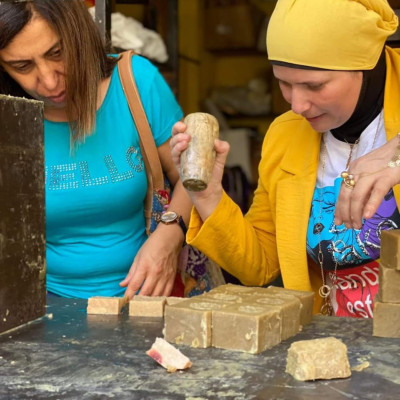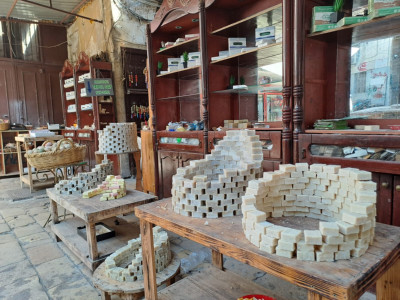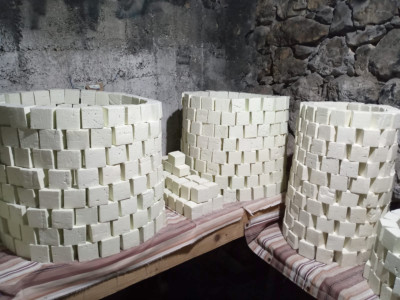Olive Oil Based Soap
 Olive oil soap is a traditional and emblematic product of Lebanon. This soap, also known as Saboun Baladi, is made from natural ingredients, mainly virgin olive oil and caustic soda. The manufacturing process is artisanal and follows methods passed down from generation to generation.
Olive oil soap is a traditional and emblematic product of Lebanon. This soap, also known as Saboun Baladi, is made from natural ingredients, mainly virgin olive oil and caustic soda. The manufacturing process is artisanal and follows methods passed down from generation to generation.
 The annual olive harvest has a certain rhythm, and a good year is always followed by a bad year. Most of the harvested olives are taken to local presses and processed into edible olive oil which is consumed or sold by the producers families. Some olives collected from the ground or black called Shitawi, are shriveled and inedible and have a bitter taste, so they will be used in soap making.
The annual olive harvest has a certain rhythm, and a good year is always followed by a bad year. Most of the harvested olives are taken to local presses and processed into edible olive oil which is consumed or sold by the producers families. Some olives collected from the ground or black called Shitawi, are shriveled and inedible and have a bitter taste, so they will be used in soap making.
 Known since Antiquity for its many benefits, Saboun Baladi is composed of four essential ingredients: olive oil, natural soda and water. Different scents can be added, such as bay leaf oil or rose water. But generally local producers use the simple formula. The first step is to mix olive oil with water and soda. The second step is to boil everything gradually over several days. This process is called saponification. This mixture gives a liquid, creamy, homogeneous soap, more or less green in color. During the third stage the soap is distributed in a liquid state and gradually hardens. It is also possible to support an origin stamp at this stage. It is then molded or cut into cubic blocks. And in the final process, the soap is arranged and refined.
Known since Antiquity for its many benefits, Saboun Baladi is composed of four essential ingredients: olive oil, natural soda and water. Different scents can be added, such as bay leaf oil or rose water. But generally local producers use the simple formula. The first step is to mix olive oil with water and soda. The second step is to boil everything gradually over several days. This process is called saponification. This mixture gives a liquid, creamy, homogeneous soap, more or less green in color. During the third stage the soap is distributed in a liquid state and gradually hardens. It is also possible to support an origin stamp at this stage. It is then molded or cut into cubic blocks. And in the final process, the soap is arranged and refined.
Most Lebanese people had for a long time abandoned the use of baladi soap, preferring more perfumed industrial soap. With the current crisis, the demand for baladi soap is increasing. Thus, the manufacture of natural soap, from olive oil, has become an important source of income for people in rural areas.
Made with almost no chemicals or dyes, handmade soap is used in homes. It is renowned for its benefits for the skin due to its natural composition. It is generally very gentle and moisturizing, suitable for sensitive skin. It does not contain harsh chemicals, making it a popular choice for those who prefer natural skincare products. It has medicinal and therapeutic effects too. It eliminates odor-causing bacteria from the body and gives it a natural scent. It helps treat certain skin conditions like eczema and psoriasis.Therefore, olive oil soap in Lebanon is an iconic product of the local culture, made from natural ingredients and appreciated for its benefits for the skin.
In rural areas of Lebanon, farmers who grow olive trees make their own soaps. In large cities like Tripoli and Saida, it is made in soap factories. The soap industry is considered one of the oldest traditional industries in Saida. In 2000, one of the city’s soap factories, converted into a museum in the old souks, opened its doors to the public. The Soap Museum, founded by the Audi Foundation, allows you to discover the different stages of soap making.

